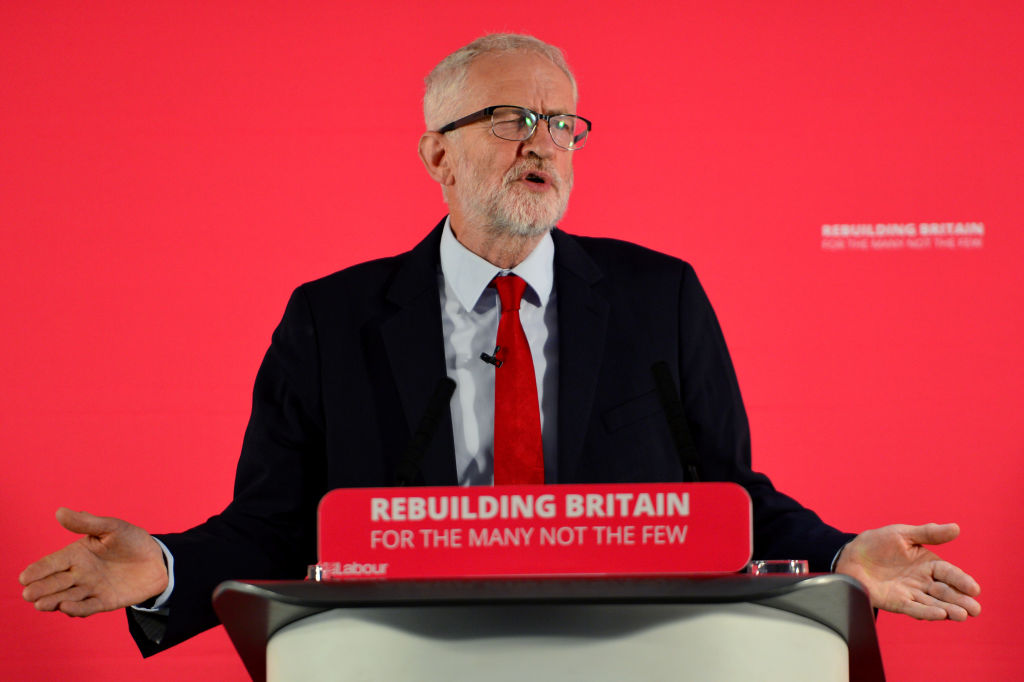So far as his keenest supporters are concerned, Jeremy Corbyn has always been on the Right Side of History. From challenging Thatcherism, taking on apartheid, standing up against the Iraq War, to opposing austerity, Corbyn, they believe, has always been unafraid to embrace morally correct causes no matter how unpopular they were at the time. This is what distinguishes him from all previous leaders of the Labour party. That makes Corbyn’s recent announcement on Brexit all the more remarkable. He has said that if Labour forms a government after the next general election and holds a referendum on Britain’s membership of the EU, he will remain neutral.
Yet according to YouGov, two-thirds of Britons think Brexit is the most important issue facing the country today. Many commentators even believe it defines the deepest crisis in British history since the summer of 1940. But on this matter, Corbyn is determined to sit on the fence. Refusing to take a decision himself, the Labour leader said he will let ‘the people decide’ whether Britain should Leave or Remain.
Of course, Corbyn is not really disinterested about Brexit. His record since the 1970s shows that in his heart he believes Britain should leave the EU. In the 1975 referendum, along with Tony Benn and the rest of the Labour left, Corbyn voted for Britain to quit the European Economic Community (as was). For the left believed the EEC was a capitalist club and a barrier to socialism.
So despite the overwhelming vote to Remain, the left changed party policy to ensure that Labour went to the country in 1983 committed to leaving the EEC, without recourse to a referendum. During the rest of the 1980s, the party became increasingly favourable to Brussels, if only to contain Thatcher’s deregulation of the economy.
But Corbyn remained implacably hostile. He consequently opposed the EEC’s transformation into the European Union in 1993. His antagonism only increased when the EU imposed severe conditions on the Greeks following the 2008 banking crisis. Even as Corbyn campaigned to become Labour leader in 2015, he refused to say whether he would support Remain in the upcoming referendum.
As Labour leader, Corbyn has had to dissemble on a heroic scale. His problem is that he leads a party whose MPs, members and voters overwhelmingly wish to stay in the EU and bitterly resent the outcome of the referendum. There are, of course, some who favour Leave but they are a small minority, albeit one Corbyn finds useful to cite when defending the soft Brexit policy he persuaded the party to adopt after 2016.
His personal position is however not ultimately dictated by considerations of party management or the need to win constituencies which voted Leave. It is primarily ideological: leaving the EU will, he believes, allow Britain to pursue the kind of socialism he and other followers of Tony Benn dreamt of in the 1970s. But if some of his leading supporters favour this line, even many of those prefer Remain.
A Leaver in his heart, Corbyn however considers the Brexit debate to be something of a diversion. For in his eyes, the truly significant historical struggle is not between Leave and Remain but the one that pits Socialism against Barbarism.
The reason he believes so many in the working class voted Leave was because of the depredations of a capitalism made even more vicious thanks to the austerity following 2008. Most of his efforts and those of his allies, especially John McDonnell, have therefore been invested into producing what is likely to be the most transformative programme Labour has ever put to the country. Labour’s next manifesto looks likely to promise to redistribute wealth and power as never before, to dramatically reset capitalism and reverse Thatcherism in one fell swoop. This is why Corbyn was elected as leader.
With the big prize of such a government in prospect, the likes of McDonnell have been willing to be much more flexible on Brexit than their natural ideological inclinations might otherwise have them be.
In contrast, Corbyn has been more obstinate. He had hoped to oppose Theresa May’s Brexit deal while it passed the Commons so he could have his cake and eat it. But she failed him. Since then, intense pressure from within the party and – perhaps most importantly – the revival of the Liberal Democrats largely at Labour’s expense forced him to embrace a second referendum. Even now he is reluctant to say whether Labour would officially support Remain or Leave.
Some have compared Corbyn’s neutral Brexit position to that of Harold Wilson, who led Labour through the 1975 referendum. With his party divided on the issue, Wilson let his ministers campaign on either side. But even Wilson – who many rather unfairly consider to be one of the most duplicitous figures to ever become prime minister – declared his support for remaining in the EEC. Perhaps events will force his hand further. But just now, Jeremy Corbyn, the man of principle, is making Wilson look good.
Steven Fielding is professor of political history at the university of Nottingham. He is currently writing ‘The Labour Party: from Callaghan to Corbyn’ for Polity Press






Comments